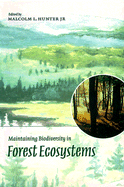Book contents
- Frontmatter
- Contents
- List of contributors
- Foreword
- Preface
- Part I Introduction
- Part II The macro approach, managing forest landscapes
- Part III The micro approach, managing forest stands
- Part IV Synthesis and implementation
- 15 Restoration ecology
- 16 Forest reserves
- 17 Forest organization, management, and policy
- 18 The economic perspective
- 19 Social perspectives
- Index
19 - Social perspectives
Published online by Cambridge University Press: 20 February 2010
- Frontmatter
- Contents
- List of contributors
- Foreword
- Preface
- Part I Introduction
- Part II The macro approach, managing forest landscapes
- Part III The micro approach, managing forest stands
- Part IV Synthesis and implementation
- 15 Restoration ecology
- 16 Forest reserves
- 17 Forest organization, management, and policy
- 18 The economic perspective
- 19 Social perspectives
- Index
Summary
On a ranger district of a national forest in western South Carolina, forest management through timber harvest had come to a virtual halt in the late 1980s. Environmental groups, citing the need to protect the biological diversity of the hardwood forests in the area, filed appeals, initiated lawsuits, and staged demonstrations to protest attempts by the U.S.D.A. Forest Service and its private contractors to implement the timber harvest and regeneration provisions of the forest plan. Businesses dependent on national forest timber were angered and embarrassed by the protests, and they were prevented from exercising their contracts to harvest Forest Service timber. Environmental groups enjoyed a temporary surge of power, but looked ahead to unending battles over the same areas and same issues. The Forest Service, unable to carry out its traditional management activities, felt beleaguered by critics from all sides. All parties were suspicious of the motives of others.
In the 1970s in the hill country of northern India, villagers in the grassroots organization Chipko banded together to prevent harvesting in historically communally owned forests, at times chaining themselves to trees to prevent them from being cut down by commercial operators. These forests had supplied fuelwood, shelter, forage and food to local people, as well as being valued for their biological diversity (Gupta 1989). Similar scenes have been played out on private and public forestland in all regions of the United States, and in the forests of developing and developed countries worldwide.
- Type
- Chapter
- Information
- Maintaining Biodiversity in Forest Ecosystems , pp. 639 - 666Publisher: Cambridge University PressPrint publication year: 1999
- 2
- Cited by



